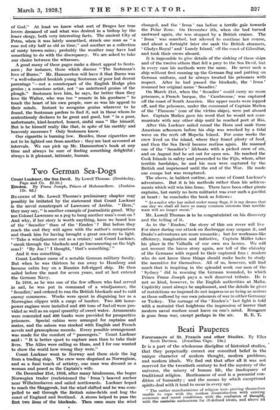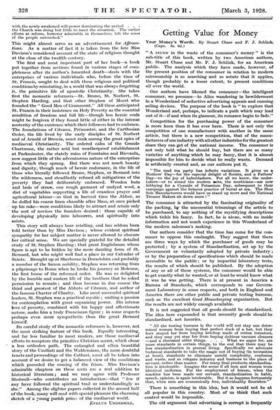Beati Pauperes
IT is a part of the wholesome discipline of historical studies, that they perpetually correct our conceited belief in the unique character of modern thought, modern problems, and modern ideals. We find out that after all it was not reserved for the twentieth century to feel the mystery of the universe, the misery of human life, the inadequacy of traditional religion. Restlessness of soul is a perennial con- dition of humanity ; and the means by which exceptional spirits deal with it tend to recur in every age. " The earlier manifestations of religion were proving themselves unable to cope with the restless dissatisfaction with exist' economic and social conditions, with the confusion of the with the unstable enthusiasm for ill-defined ideals, and above al with the newly awakened will-nosier dominating the period . . . the Church was doing but little to meet the situation. The earlier efforts at reform, however admirable in themselves, left the mass of the people untouched."
This might almost serve as an advertisement for Affirma- tions. As a matter of fact it is taken from the late Miss Davison's considered account of the state of religious thought
at the close of the twelfth century.
The first and most important part of her book—a book put together from sections found in various stages of com- pleteness after its author's lamented death—deals with the enterprises of various individuals who, before the time of St. Francis, sought to deal with these religious and political conditions by reinstating, in a world that was always forgetting it, the primitive life of apostolic Christianity. She takes first the monastic reformers—St. Bruno, St. Norbert, St. Stephen Harding, and that other Stephen of Muret who founded the " Good Men of Grammont." All these anticipated St. Francis in their insistence on Holy Poverty as the essential condition of freedom and full life—though less heroic souls might be forgiven if they found little of either in the intense austerity of the existence which their followers had to embrace. The foundations of Citeaux, Premontre, and the Carthusian Order, the life lived by the early disciples of St. Norbert and of Arnold of Brescia, must rank among the great epics of mediaeval Christianity. The ordered calm of the Grande Chartreuse, the rather arid but weatherproof establishment at Parkminster, the stately ruins of Fountains and Rievaulx, • now suggest little of the adventurous nature of the enterprises from which they sprang. But there was not much beauty and dignity, though much of heroic endurance, in the life of those who literally followed Bruno, Stephen, or Bernard into the wilderness, and steadfastly refused all mitigations of the poverty they had deliberately embraced. Wooden huts and beds of straw, one rough garment of undyed wool, a diet of vegetables supporting a life of ceaseless prayer and agricultural labour—so that in harvest time the Abbot, as he doffed his coarse linen chasuble after Mass, at once picked
Up his rake—were conditions likely to attract and retain only the sort of novices the founders desired : those capable of
developing physically into labourers, and spiritually into saints.
- This story will always bear retelling, and has seldom been told better than by Miss Davison ; whose evident spiritual sympathy for her subject matter is never allowed to obscure her critical sense. We are specially grateful for the detailed study of St; Stephen Harding ; that great Englishman whose figure is apt to be hidden by the more dazzling form of St. Bernard, but who might well find a place in our Calendar of Saints. Brought up at Sherborne in Dorsetshire and probably a member of the *Saxon nobility, Stephen was returning from a pilgrimage to Rome when he broke his journey at Molesme, the' first house of the reformed order. He was so delighted by the humble and austere life of the brothers that he asked permission to remain ; and thus became in due course the third and greatest of the Abbots of Citeaux, and author of ' the famous Charter of Charity. Like most successful spiritual leaders, St. Stephen was a practical mystic ; uniting a passion for contemplation with great organizing power. His intense love of poverty, combined with his happy and affectionate • nature, make him a truly Franciscan figure ; in some respects perhaps even more sympathetic than the great Bernard himself.
Its careful study of the monastic reformers is, however, not the most striking feature of this book. Equally interesting, and far less familiar to most readers, are those mediaeval efforts to recapture the primitive Christian secret, which chose a less orthodox path. The entangled and often beautiful story of the Umiliati and the Waldensians, the more doubtful tenets and proceedings of the Cathari, must all be taken into account if we desire to get a balanced view of the conditions which preceded the coming of the friars. Miss Davison's admirable chapters on these sects are a real addition to historical literature ; and we may agree with Professor Shotwell—who contributes an introduction—that " few if any have followed the spiritual trail so understandingly as she." Among the slighter papers collected in the second half of the book, many will read With special pleasure the charming sketch of a young parish priest of the mediaeval world.
EVELYN" UNDERHILL.































































 Previous page
Previous page